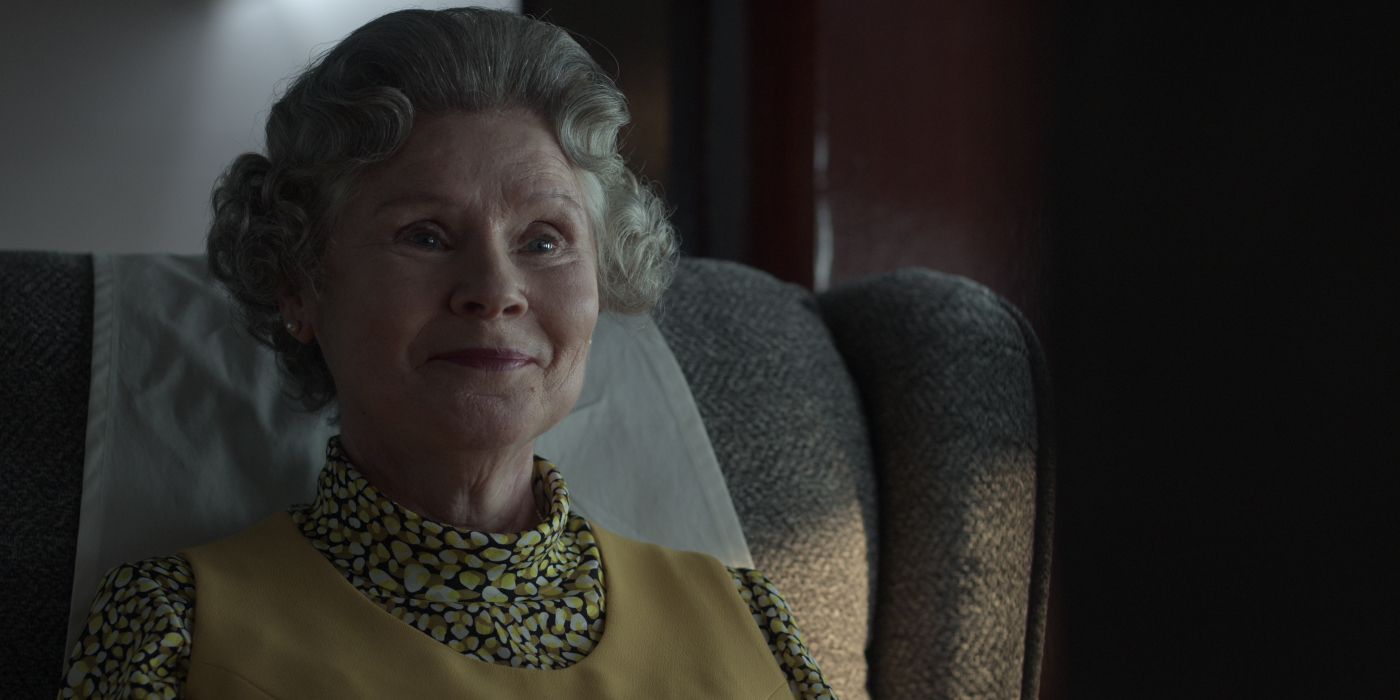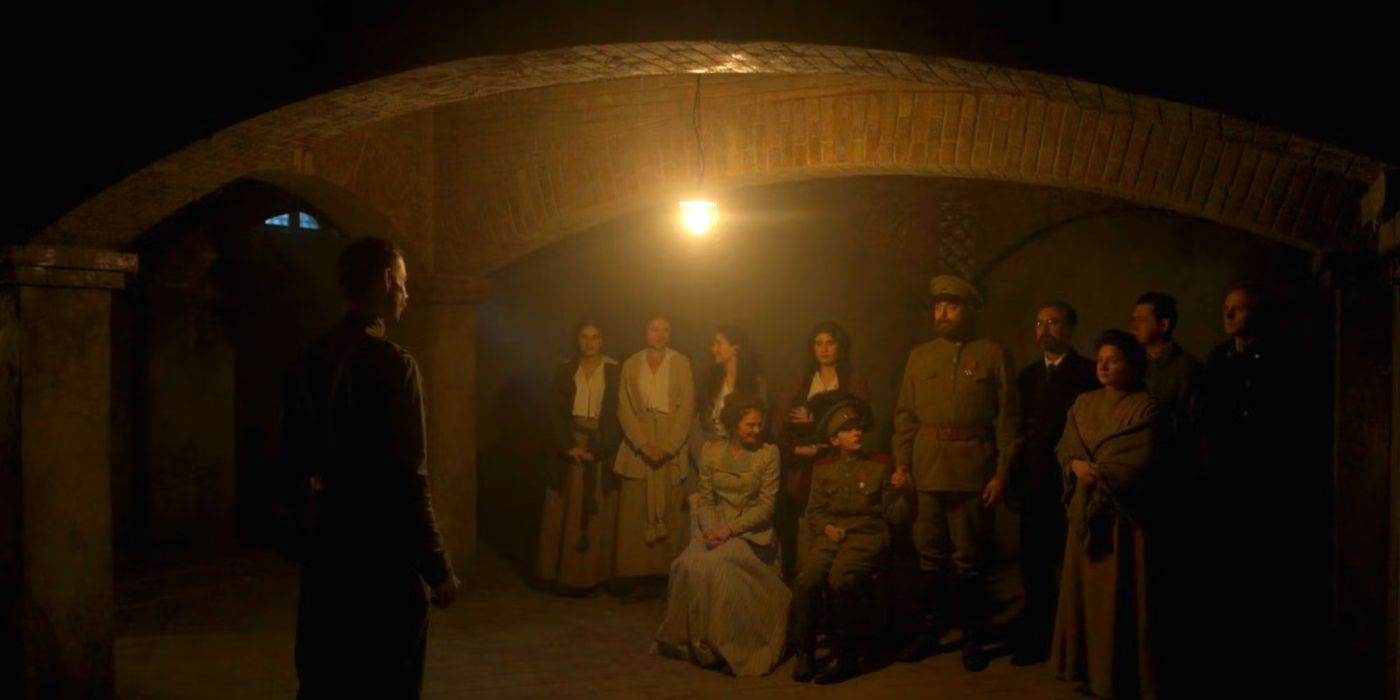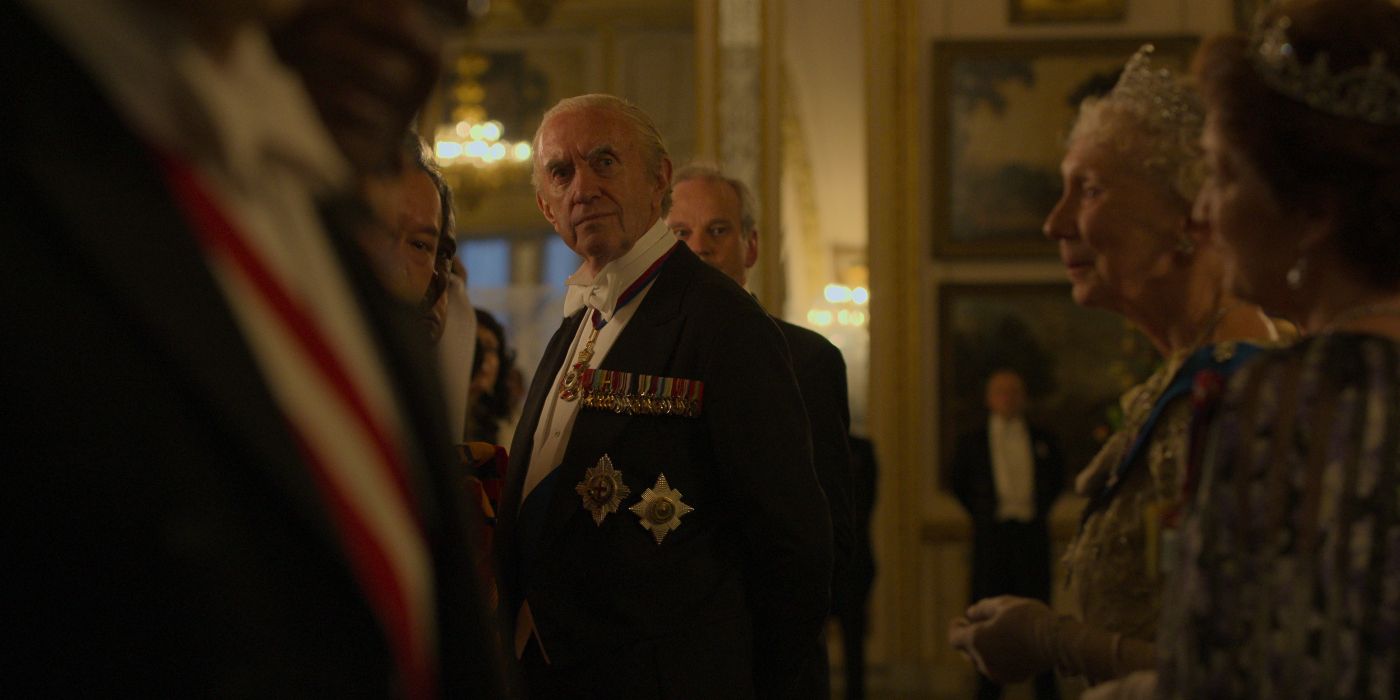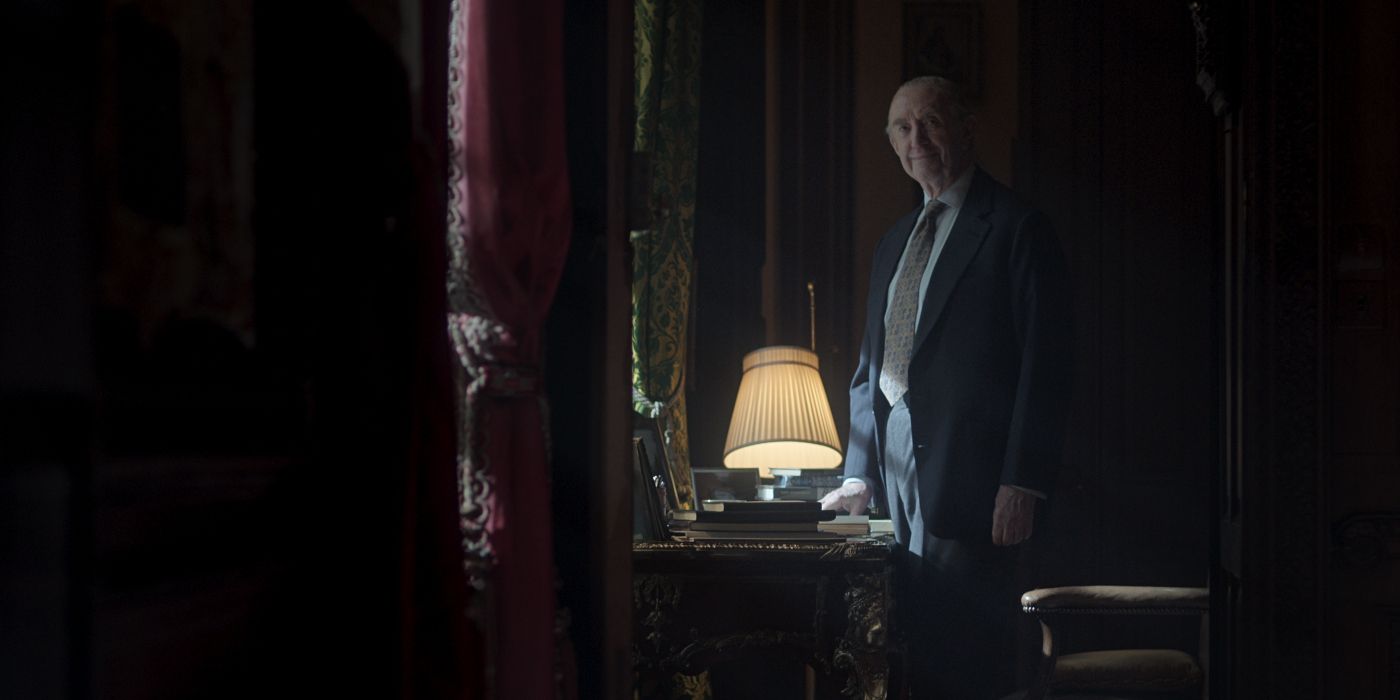Episode 6 of The Crown Season 5 starts with another flashback opening, this time to London in 1917, where World War I litters the streets of London with rubble and aimless soldiers. Yet inside the palace, King George V is a world away. A letter from the Prime Minister arrives, urging George to consider offering asylum to his first cousin Nikolai Romanov, the Tsar of Russia, and his besieged family. George is unbothered; his primary focus is his next pheasant hunt, and to him, the most exciting detail of the letter is not the plea contained within but the particular shade of ink on the envelope. You would think a royal would pay close attention to a fellow monarch caught in the throes of a violent Communist revolution. Instead, it appears he’s yet another royal desperately out of touch (accentuated by a hilariously unacknowledged parrot on his shoulder). He punts on the issue and defers to his wife (happy wife, happy life, I guess?).
Her answer becomes gravely apparent in the following sequence when soldiers wake the Romanovs in the middle of the night under the guise they are moving the family to safety. Nikolai thanks the heavens, believing this to be the work of his cousin King George. He’s half right. The soldiers lead Nikolai and his entire family to a basement and then unceremoniously execute them by firing squad in the name of the revolution. It’s an uncharacteristically disturbing display of violence for The Crown: the Romanovs helplessly beg for their lives as, one by one, the soldiers murder them in a hail of gunshots and bayonets. Russian brutalism exemplified.
Flash forward to modern day, when Russia is again in turmoil, this time with the fall of the USSR. Boris Yeltsin (Anatoliy Kotenyov) has come to power, the first democratically elected ruler in its history, and Prime Minister John Major (Jonny Lee Miller) comes to tell the Queen (Imelda Staunton) about his first impressions. In short… Yeltsin is a total frat star. Major could barely keep up with Bro-is as he slammed vodka shots and danced on tables. The only thing he could discern from the slurring is that, apparently, Boris is dying for an invitation to Britain. The only thing he loves more than chugging is Britain and the monarchy.
The Queen, tickled by the news, shares the tidbit with Prince Philip (Jonathan Pryce). Our favorite carriage head couldn’t care less as he hurriedly prepares for a three-week world tour filled with — you guessed it — more carriage competitions. There’s a riff growing between them, one that Elizabeth expressly calls out (“more and more different”). Philip ignores the jab, and we quickly see what has the spring in his step. Penny (Natascha McElhone), his new platonic love (and wife of his godson!), is along for the ride on Philip’s jaunt around the world. Philip beams as she expresses her newfound love for carriages and watches him at his many press appearances. It’s clear they’ve gotten uncomfortably close, and one wonders if the feeling is mutual or if Penny is playing at something larger.
The Queen invites her drunk admirer Boris to visit, but her aide is cautious. It turns out Boris helped sweep away the sins of the Romanov execution by destroying the Ipatiev House, where they met their demise. At their first lunch, Boris ironically toasts “the tsarist times” in support of monarchy and a bid for favor with the Queen, hoping she will visit Moscow. It backfires when she uses it as an opportunity to bring up his role in covering up the legacy of the last Tsar’s murder — something she views as a direct offense to her family, as Nikolai was her grandfather’s cousin. Boris tries to distance himself from the act — after all, he was just a cog in the Communist party machine — but the Queen presses. He concedes that in exchange for her coming to Moscow, he will try to find the bodies to honor their memory with a proper burial. That said, Boris has the audacity to let his real feelings known later that day when, despite being directly next to the Queen, he laughs in Russian that it’s the British’s, not the Russians’ fault, that the Romanovs are dead (which begs the question: does Elizabeth not have a translator with her at all times?).
Regardless, Boris follows through on his promise, and sure enough, the Russians find the mutilated bones of the Romanov family. The problem is that they can’t 100 percent identify the bodies due to the apparent acid the Russian soldiers used to burn them after the execution (talk about insult to injury). The solution? An early '90s 23andMe by using a DNA sample from the closest living relative —which, in this case, is Philip (the Tsarina was his great-aunt). For those of you keeping score at home, yes, Philip's great-aunt married the cousin of Elizabeth’s great-grandfather. What a tangled and incestuous web we weave. Once again, Philip doesn’t seem very interested in Elizabeth’s news until he makes a petty point that Elizabeth didn’t ask many questions about the DNA authentication process.
This seems like a strange point to make until you realize he’s mentally justifying his emotional infidelity with Penny. In the next scene, she practically falls all over herself to learn more about the science behind the DNA authentification and repeatedly flatters Philip’s importance to the whole process. Philip feigns at downplaying her praise while also trying to quiet his friend down, so he can better hear Penny emphasize his worth. One wonders if Philip’s infatuation with Penny is due to their shared interests, or because his ego benefits from feeling significant again after years of living in his wife’s shadow. Philip, encouraged by Penny, becomes obsessed with his Russian lineage on his Great-Aunt’s side. Discussing Philip’s newfound passion with her mother and sister, Elizabeth incorrectly sees the defense of the Romanovs legacy and memory as a new shared passion for them. It is a comforting thought to Elizabeth, as she admits she and Philip have few common interests these days. She hopes their upcoming trip to Russia will be a shared adventure where they can reconnect over this newfound bond.
Unfortunately, the trip proves to be the opposite. Repeatedly, Elizabeth tries to connect, and repeatedly, Philip ignores her. She tells a Russian joke on the plane that barely elicits a chuckle, he won’t make eye contact with her when the Russians welcome her with a (less-than-rousing) rendition of “God Save the Queen,” and he spends most of his time alone rather than with her. Later at a state dinner, Elizabeth calls for a renewed partnership between Russia and Britain, even though, at times, they have seemed “to live in different worlds.” Once again, Peter Morgan, the master of subtlety, hits us over the head with the point. She might as well be talking about her and Philip.
Later, Elizabeth finally confronts Philip about the increasing iciness between them. He lashes out, lamenting all that he has given up to be with her. In the name of the Crown and duty, he gave up his autonomy and now claims to be living a life of loneliness and disenchantment. As icing on the cake, he admits to having found a solution through companionship with Penny (again - his goddaughter-in-law!). He doesn’t need Elizabeth — Penny and his “gang” of carriage heads are all he needs to feel fulfilled. Elizabeth’s shocked at his relationship with a member of their own family, even if it is platonic. Furthermore, she’s hurt — isn’t she supposed to be his soulmate? She asks him to end this “companionship,” and he doubles down by asking Elizabeth to strike up a friendship with Penny. That way, he jabs, she might actually learn something from Penny’s “curiosity” — like how the Romanovs' death was the British’s fault.
And thus, the purpose of the dramatic and violent Romanov execution becomes clear. Morgan attempts to draw parallels between that first sequence and Philip and Elizabeth’s marital drift. In their emotional plea for support in the name of family ties, the Romanovs represent Philip. In their pragmatic decline to assist in the name of duty, the British represent Elizabeth. Philip’s frustration with Elizabeth is her unemotional approach to family and personal relationships in the name of the Crown, and her grandfather’s choice not to help his cousin reminds him of Elizabeth’s coldness (although Philip comparing his life as second fiddle to being brutally stabbed to death seems a bit dramatic).
It’s a lesson that falls on deaf ears for Elizabeth. Elizabeth agrees to meet with Penny, but not for Philip’s sake. She wants to feel out her goddaughter’s intentions primarily for self-defense (the tabloids can’t draw the wrong conclusion if Elizabeth spends time with Penny). They go for a tense walk and discuss the Romanov’s alleged betrayal by Elizabeth’s grandparents. Penny again asserts that it was a disloyal act, going as far as to say it was due to Elizabeth’s grandmother’s petty jealousy of the Tsarina’s beauty. Elizabeth allows Penny the forum, but only to trounce her with the point that it was a practical decision. The Tsarina was German, and the British were at war with the Germans. To help them would be to open up the Crown to criticism by the public, a reasoning that appeals to Elizabeth’s sense of duty and pragmatic rule. Elizabeth also says she has first-hand knowledge her grandmother was devastated by the news of the Romanovs' murder, but as Queen, she was not allowed to let on her feelings. This too, appeals to Elizabeth, as she knows the burden of monarchy all too well.
The episode concludes with Elizabeth learning from the Prime Minister that the Russians have authenticated the bodies, and now the Romanovs can get their proper burial. He congratulates her on her success, as well as her upcoming 47th wedding anniversary. Elizabeth, no doubt due to recent events, becomes reflective. She asks Major, who also has been married for decades, how they’ve achieved it. He answers with advice from Dostoevsky, of all people. The key to a successful marriage is never interfering with the other’s soul. The final scene shows Elizabeth at peace as she’s ostensibly taken this advice to heart and plays with her corgis while Philip writes down the hall in another room. Parallel play isn’t just for children, it appears, and may be the key to surviving a life-long marriage — that, and not having any cold cousins who sell you out to murderous Communists.




